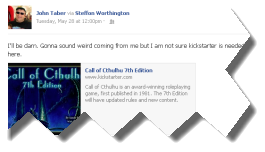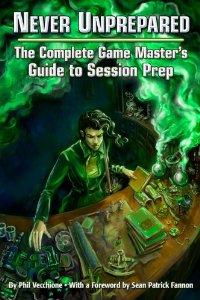FLGS And Kickstarters: A FB Conversation
 I recently backed the Call Of Cthulhu 7th Edition kickstarter. After backing the project I posted about it on Facebook (FB). This started off a wonderful discussion thread where luminaries like Derek Hiemforth, Scott Ruggels, and James Jandebeur submitted their takes on the topic. I thought it was so good that I wanted to cross-post it on my blog.
I recently backed the Call Of Cthulhu 7th Edition kickstarter. After backing the project I posted about it on Facebook (FB). This started off a wonderful discussion thread where luminaries like Derek Hiemforth, Scott Ruggels, and James Jandebeur submitted their takes on the topic. I thought it was so good that I wanted to cross-post it on my blog.
John Taber: I’ll be darn. Gonna sound weird coming from me but I am not sure kickstarter is needed here (i.e. for a CoC 7th Edition kickstarter).
Derek Hiemforth: Y’know, I really think Kickstarter may become a double-edged sword for the tabletop game world. Because while it’s often good for game publishers (especially those with an established following), and it might reach a few people who would never be reached through traditional distribution, it can often be *not* so good for game stores.
I’ve heard more than one retailer note that they won’t order any more Kickstarted games (for shelf stock; they’ll still do special orders). Not because of some moral objection or pouting about being cut out of the loop, but simply because they don’t sell. Why? Because (especially for already-well-known games) almost everyone who wanted it, got it by backing the Kickstarter. So by the time it would reach the store shelves, the demand has largely been filled already.
And who knows? Maybe it’ll turn out that that’s okay, and that the future role of the “game store” lies more in providing play space. But somehow I don’t think so. Kickstarter is great for making niche products possible. And I definitely understand why game publishers might want to Kickstart well-known, well-liked properties, in hopes of hitting the “Fate Core” lottery. 🙂
But long-term, I have misgivings about the practice’s impact on the game trade and on tabletop RPG gaming as a hobby. It’s already long been a shrinking niche. If we get to a point where you don’t see it on game store shelves anymore, and only discover it online if you already know about it, I fear we run the risk of becoming even more niche-y, and shrinking even more…
John Taber: I can see the impact on game stores but for me as an “end user RPG gamer already” kickstarters are awesome. They are a way to get products or special editions of products into my hands that I may not have been able to get without kickstarter. In fact out of my 50+ pledged kickstarter campaigns I bet only 1 or 2 would have been released WITHOUT being kickstarted first. CoC 7th is one of the few that would have been released WITHOUT a kickstarter IMHO…thus my comment. 😉 Anywho…well put reply Derek…miss talkin’ with about this stuff in person. Nobody in my old time gaming group…my only regular session…likes to talk about the RPG industry. 🙁
Scott Albert Henry Ruggels: I like kickstarter as a concept. On the other hand, I see what the problem is, for the retailers. It’s a very valid argument. Personally for RPG Publishers, I am not really the target audience any more, because the current generation’s preferences aren’t mine, in terms of Mechanics and background. Back in the days of Rec.arts.frp.arguments.miniscule in the old newsgroups, styles were discussed, and axes of interest and classification were developed. What has happened is that the publishers, chasing shorter and shorter attention spans and more media saturated imaginations, have ever simpler or missing mechanics, and ever more genre savvy (Dramatist), and self referential rules. Chasing trends, and chasing fashion, and that leaves my mechanics heavy, Situationist (simulationist, dice don’t lie) sound unsatisfied. What I want would be RPG products of more universal value, like a new battle mat, supplements for Hero System or GURPS, or Cyberpunk, rather than a whole new set of rules for how to run a Zombie Apocalypse Campaign, or how to convert the latest Cable TV darling show into a table top campaign. So, until I can get a small 3d printer to make 25mm or 54mm miniatures from my Mudbox and Maya files, I am reluctant to back any or many RPG Kickstarters.
Derek Hiemforth: Aaaaand… it’s funded already. Depending on what kind of stretch goals they put in place, this shows all signs of potentially going through the roof…
James Jandebeur: My problem with the idea that Kickstarter hurts game stores is that what you are describing was already the trend in every game store I have seen in the last fifteen years with the exception of Game Kastle, at least for the materials that I am the most interested in. They don’t stock them, and I lose interest since I can order them myself. It may be accelerating it, but it was already there.
John Taber I agree with Derek and James…yeah it is a problem but yeah it has been there for a while. In my mind the benefits of kickstarters on the RPG industry outweighs the negative impact on game stores. It seems like having many more products that people are willing to put up money for before they are produced (i.e. where they have a vested interest) means that game stores should have more products to sell that folks will want to buy. Yeah some folks who got in early will not need to buy them but many other might. My old gaming group is a good example. In that group I am the only one who follows the industry and does kickstarters. If I decide to run one of them many of the players in my game will buy products. So the kickstarter got the product initially produced and made it possible for my players to buy it.
Derek Hiemforth: Kickstarters for projects that couldn’t get done otherwise, or Kickstarters where the goal amount is literally just a Kick”starter” amount to cover publishing costs, I think are fine. The danger, IMV, lies in taking books like this — that most local game stores would stock, and that the game publisher is in no real danger of not being able to sell — and making it impossible for game stores to compete.
For example, say you’re Kickstarting a book that game stores will sell for $40. But by backing the Kickstarter for $40, you get the book, the PDF (which the game store can’t provide), free delivery (which the game store can’t provide), a bunch of neato freebie extras from stretch goals or whatever (which the game store can’t provide), and credit in the book (which the game store can’t provide). Obviously, anyone who knows about the product early enough, and who trusts the creators to follow through on the project, would be a complete fool to *not* back the Kickstarter.
I know multiple game stores that used to back Kickstarters that had retailer tiers, in order to get some for the store shelves, but have since stopped doing that, specifically because *they didn’t sell*. So either the projects in question just had no appeal to anyone other than the people who backed the Kickstarter, or everyone who wanted the book already got it by backing the Kickstarter. It’s not like they’re speculating that *maybe* Kickstarted books won’t sell… they’re observing that the Kickstarted books *didn’t* sell.
The obvious solution would be to find some kind of happy medium, where there’s still enough reason for hardcore fans to want to back the Kickstarter that it will still get funded, but not *so* much reason to back the Kickstarter that one would be cutting their own throat by choosing to buy it at their FLGS instead. For instance, maybe any pledge levels that include the physical book could actually cost *more* than the book will retail for, but make it appealing to hardcore fans in other ways (credit in the book, signed copies, obscure swag, etc.). That would give the more casual fan, or one who didn’t care about that stuff, a reason to wait for it to hit the FLGS, and pick it up at the slightly lower retail price.
Of course, this would absolutely lower the amount of money game *publishers* would make through the Kickstarters, even if the Kickstarters still funded successfully. So it’s certainly understandable why they might be reluctant to do it. They would essentially be making a sacrifice for the overall health of the game trade, and it might make more sense for them to look out for themselves (especially if they feel game stores aren’t exactly doing *them* any favors).
I dunno… I think it’s most likely still evolving, and that it will either settle into something that co-exists in some kind of symbiotic relationship with game stores, takes over the RPG market almost entirely, or almost entirely fades away from the market. Right now, I think it’s still in flux.
Derek Hiemforth: Or to address James & John’s point more directly, I think there’s a difference between “People at our store don’t buy these here because we don’t stock them,” and “We don’t stock these, because when we have, people haven’t bought them here.” I agree that many game stores don’t really seem to get the difference, but I know at least some do.
James Jandebeur: I suspect that game stores, if they survive, will have wireless Internet access, virtual bookshelves on the walls, a POD station, and a place to play. Which wouldn’t be all bad.
Derek Hiemforth: I agree. Actually, I think as POD quality improves, pretty much all printing, or at least, all printing for niche audiences like the RPG market, will go POD…





